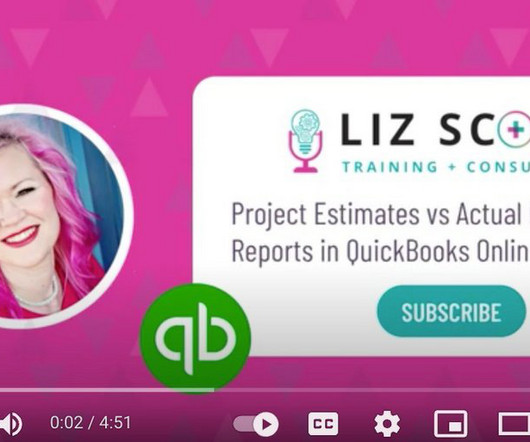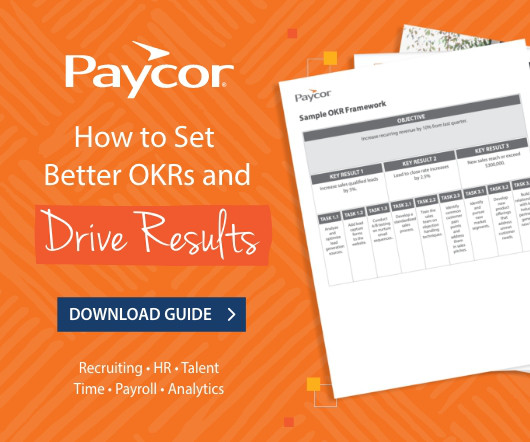Everything You Should Know About Soccer & Business
Insightful Accountant
MAY 21, 2023
Xero's Ben Richmond shares some takeaways every accountant can glean from the FIFA Women’s World Cup 2023.

Insightful Accountant
MAY 21, 2023
Xero's Ben Richmond shares some takeaways every accountant can glean from the FIFA Women’s World Cup 2023.

Accounting Tools
MAY 21, 2023
Related Courses The Balance Sheet The Interpretation of Financial Statements What are the Contents of a Cash Basis Balance Sheet? Under the cash basis of accounting , transactions are only recorded when there is a related change in cash. This means that there are no accounts receivable or accounts payable to record on the balance sheet , since they are not noticed until such time as they are paid by customers or paid by the company, respectively.
This site is protected by reCAPTCHA and the Google Privacy Policy and Terms of Service apply.

Insightful Accountant
MAY 21, 2023
Liz Scott is back with a new enhancement that makes this process even easier in QuickBooks Online Advanced. Check out her story and video.

Accounting Tools
MAY 21, 2023
Related Courses How to Audit Cash How to Audit Fixed Assets How to Audit Inventory How to Audit Receivables How to Conduct an Audit Engagement What are Management Assertions? Management assertions are claims made by members of management regarding certain aspects of a business. The concept is primarily used in regard to the audit of a company's financial statements , where the auditors rely upon a variety of assertions regarding the business.

Speaker: Victor C. Barnes, CPA, MBA
In the climb from contributor to leader, the rules quietly change. But if you’re aiming for the summit, the air gets thinner, and what got you here won’t be enough to get you to the top. 🗻 What made you successful early in your finance career—technical accuracy, sharp analysis, flawless execution—won’t be what carries you to the next level. The higher you go, the more your effectiveness depends on how you connect, adapt, and communicate.

IMA's Count Me
MAY 21, 2023
Dive deep into the world of Environmental, Social, and Governance (ESG) in business with our latest episode of the 'Count Me In' podcast. Hosted by a panel of experts, which includes Catie Serex, Douglas Hileman and Dan Mosher, our podcast uncovers the truth behind ESG, its importance in today's business world, the challenges it presents, and its potential role in fraudulent activities.

Accounting Tools
MAY 21, 2023
Related Courses Bookkeeper Education Bundle Bookkeeping Guidebook What is a Full Charge Bookkeeper? A full-charge bookkeeper is the same as a bookkeeper , except that the "full charge" part of the title designates the person as being solely responsible for accounting. This means that the full charge bookkeeper reports straight to a senior manager, such as the president, and may interact directly with the company's board of directors and auditors.
Financial Ops World brings together the best financial operations content from the widest variety of thought leaders.

Accounting Tools
MAY 21, 2023
Related Courses Bookkeeping Guidebook Closing the Books New Controller Guidebook What are Accounting Adjustments? An accounting adjustment is a business transaction that has not yet been included in the accounting records of a business as of a specific date. Most transactions are eventually recorded through the recordation of (for example) a supplier invoice , a customer billing, or the receipt of cash.

Accounting Tools
MAY 21, 2023
Related Courses Business Ratios Guidebook The Interpretation of Financial Statements What is the Profit Ratio? The profit ratio compares the earnings reported by a business to its sales. It is a key indicator of the financial health of an organization. The profit margin ratio is customarily used in each month of a month-to-month comparison, as well as for annual and year-to-date income statement results.

Accounting Tools
MAY 21, 2023
Related Courses Real Estate Accounting Real Estate Investing Property Management Accounting Real estate investing can be a highly profitable activity for many people. This is especially the case if you are willing to hold onto property for an extended period of time, to take advantage of property appreciation. However, it is also possible to go wrong in this area and lose your investment.

Accounting Tools
MAY 21, 2023
Related Courses Ethical Frameworks in Accounting Professional Rules of Conduct What is Confidential Client Information? Confidential client information is any client information that is not available to the public. Confidential information may include technology, trade secrets, information pertaining to business operations and strategies, and information pertaining to customers, pricing and marketing.

Speaker: Kim Beynon, CPA, CGMA, PMP
The most overlooked, yet most critical, element of transformation is preparing people for change. Automation and AI aren't just technical upgrades, they’re cultural shifts which can challenge identities. That’s why change management isn’t a side project—it’s the foundation. In finance, where precision and process rule, navigating change can feel especially disruptive.

Accounting Tools
MAY 21, 2023
Related Courses Closing the Books The Balance Sheet The Year-End Close The balance sheet is one of the three reports within the financial statements. There are a number of steps to follow to prepare a balance sheet. The recommended approach to doing so is noted in the following steps. Step 1. Print the Trial Balance The trial balance is a standard report in any accounting software package.

Accounting Tools
MAY 21, 2023
Related Courses Accountants’ Guidebook Bookkeeper Education Bundle Bookkeeping Guidebook What is a Journal Entry? A journal entry is used to record a business transaction in the accounting records of a business. A journal entry is usually recorded in the general ledger ; alternatively, it may be recorded in a subsidiary ledger that is then summarized and rolled forward into the general ledger.

Accounting Tools
MAY 21, 2023
Related Courses The Balance Sheet The Interpretation of Financial Statements What is the Statement of Financial Position? The statement of financial position is another term for the balance sheet. The statement lists the assets , liabilities , and equity of an organization as of the report date. As such, it provides a snapshot of the financial condition of a business as of a specific date.

Accounting Tools
MAY 21, 2023
Related Courses Corporate Finance Crowdfunding What is a Demand Loan? A demand loan is a borrowing instrument that allows the lender to recall a loan on short notice. Once notified, the borrower must repay the full amount of the loan and any associated interest. This arrangement also allows the borrower to repay the loan at any time without an early repayment penalty.

Speaker: Mark Gilham, FCCA, CPP
Finance used to be the function that counted, now it's the one that’s counted on. 📊 For accounting firms, controllers, and finance leaders, expectations are rising faster than headcount. Businesses want agile forecasts, granular analysis, seamless reporting, and smart automation—often without added resources while demanding uncompromised accuracy and compliance.

Accounting Tools
MAY 21, 2023
Related Courses Business Insurance Fundamentals What is an Insurance Premium? An insurance premium is the cost required to obtain insurance coverage. The insured party pays the premium to the insurer either in advance of coverage or over the course of the coverage period. If the insured party fails to pay a premium, the related insurance coverage is cancelled, though it may be restored if the premium is subsequently paid.

Accounting Tools
MAY 21, 2023
Related Courses How to Conduct an Audit Engagement What is Opinion Shopping? Opinion shopping is the practice of searching for an auditor that will issue an unqualified opinion on a company’s financial statements. An unqualified opinion indicates that the firm’s financial statements are fairly presented, and that they conform to the applicable accounting framework.

Accounting Tools
MAY 21, 2023
Related Courses Human Resources Guidebook Payroll Management A payroll card is a debit card into which employee pay is deposited. The original reason for these cards was to provide funds for unbanked employees. Advantages of Payroll Cards Payroll cards are superior to direct deposit in many ways, as noted below. First Payment is Electronic When paying an employee through direct deposit, the first payment to a new employee is with a check , since the bank wants to prenote the first direct deposit

Accounting Tools
MAY 21, 2023
Related Courses Accountants’ Guidebook Bookkeeper Education Bundle Bookkeeping Guidebook What is a Debit Balance? There are several meanings for the term debit balance that relate to accounting, bank accounts, lending, and investing. They are noted below. Debit Balance in Accounting A debit balance is an account balance where there is a positive balance in the left side of the account.

Advertiser: Paycor
Great leadership development is the key to sustainable business growth. Are you ready to design an effective program? HR can use Paycor’s framework to: Set achievable goals. Align employee and company needs. Support different learning styles. Empower the next generation of leaders. Invest in your company’s future with a strong leadership development program.

Accounting Tools
MAY 21, 2023
Related Courses Revenue Management Revenue Recognition What is a Reference Price? A reference price is the price that a customer considers to be reasonable to pay for a product or service. A business should be aware of the reference price perceptions of customers when setting price points for company products. For example, if the reference price used by customers is the pricing range for a competitor's product line , a business could set its prices slightly lower than the competitor's prices.

Accounting Tools
MAY 21, 2023
Related Courses Accountants' Guidebook GAAP Guidebook A loan may require periodic compliance with lender covenants. A covenant violation may give a lender the right to demand immediate payment of the loan. A debt obligation should be classified as non-current, unless there has been a covenant violation that gives the lender the right to call the debt, and it is probable that the entity will not be able to comply with the covenant within the next 12 months.

Accounting Tools
MAY 21, 2023
Related Courses Accounting Controls Guidebook Accounting Procedures Guidebook What is an Authorization? Authorization occurs when a person with a certain level of authority gives permission for an action to take place. Stated differently, authorization occurs when you allow someone to do something. Authorization is a key component of the control systems used within an organization.

Accounting Tools
MAY 21, 2023
Related Courses Revenue Management Revenue Recognition What is Penetration Pricing? Penetration pricing is the practice of initially setting a low price for one's goods or services, with the intent of increasing market share. The low price is likely to attract price-sensitive customers. The price may be set so low that the seller cannot earn a profit.

Speaker: Andrew Skoog, Founder of MachinistX & President of Hexis Representatives
Manufacturing is evolving, and the right technology can empower—not replace—your workforce. Smart automation and AI-driven software are revolutionizing decision-making, optimizing processes, and improving efficiency. But how do you implement these tools with confidence and ensure they complement human expertise rather than override it? Join industry expert Andrew Skoog as he explores how manufacturers can leverage automation to enhance operations, streamline workflows, and make smarter, data-dri

Accounting Tools
MAY 21, 2023
Related Courses Business Ratios Guidebook Financial Analysis The Interpretation of Financial Statements What is EBITDA? EBITDA is a contraction of earnings before interest, taxes, depreciation , and amortization. It is used to evaluate the performance of a business before the impact of financing decisions. EBITDA approximates the operational results of a business on a cash flow basis.

Accounting Tools
MAY 21, 2023
Related Courses Behavioral Ethics Ethical Frameworks in Accounting Unethical Behavior What is Greed? Greed is the selfish want for more wealth or power than a person actually needs, and to the detriment of others. The concept can be taken further, where a person can never have enough, and so is always striving for more. The concept can be confused with the needs of an extremely ambitious person – the difference is that an ambitious person knows when to stop after having reached his or her goal.

Accounting Tools
MAY 21, 2023
Related Courses Activity-Based Costing Cost Accounting Fundamentals What is a Standard Labor Rate? There are two definitions of the standard labor rate concept, which are noted below. In both cases, there may be a number of standard labor rates, each one based on the general skill sets of the employees presumed to be engaged in the related work. If there is only a single standard labor rate, it should be based on a weighted average of the fully burdened labor costs of those employees most likely

Accounting Tools
MAY 21, 2023
Related Courses Public Company Accounting and Finance What is a Stock Register? A stock register is a detailed record kept of the shares issued by a corporation , as well as any repurchases and transfers between shareholders. A register is most commonly maintained by a publicly-held company, but can be kept by any corporation, especially when there are many shareholders.

Speaker: Cheryl J. Muldrew-McMurtry
Distributed finance teams are rewriting how the back-office runs, and attackers are taking notes. Disconnected workflows, process blind spots, and rising cyber threats are more than just growing pains—they’re liabilities. The challenge isn’t just going remote. It’s building resilient systems that protect accuracy, control, and speed across every transaction and touchpoint.

Accounting Tools
MAY 21, 2023
Related Courses Corporate Cash Management Investing Guidebook Treasurer's Guidebook An investor would buy a bond at a premium price when the bond’s stated interest rate is higher than the market interest rate. A premium bond is a bond whose current selling price on the open market is higher than its par (or stated) value. This situation arises when the stated interest rate on the face of the bond is higher than the market interest rate currently in existence.

Accounting Tools
MAY 21, 2023
Related Courses Activity-Based Costing Activity-Based Management Cost Accounting Fundamentals What is a Cost Pool? A cost pool is a grouping of individual costs , typically by department or service center. Cost allocations are then made from the cost pool. For example, the cost of the maintenance department is accumulated in a cost pool and then allocated to those departments using its services.

Accounting Tools
MAY 21, 2023
Related Courses Accountants’ Guidebook Bookkeeper Education Bundle Bookkeeping Guidebook What is a Compound Journal Entry? A compound journal entry is an accounting entry in which there is more than one debit, more than one credit, or more than one of both debits and credits. It is essentially a combination of several simple journal entries ; they are combined for either of the following reasons.

Accounting Tools
MAY 21, 2023
Related Courses Revenue Management Revenue Recognition What is Psychological Pricing? Psychological pricing is the practice of setting prices slightly lower than a whole number. This practice is based on the belief that customers do not round up these prices, and so will treat them as lower prices than they really are. Customers tend to process a price from the left-most digit to the right, and so will tend to ignore the last few digits of a price.

Advertiser: Paycor
Before you can achieve success, you have to define it. Objectives and Key Results (OKRs) give you the framework to do just that. Paycor’s free guide includes a step-by-step process leaders can use to work toward – and achieve – their loftiest business goals.
Let's personalize your content